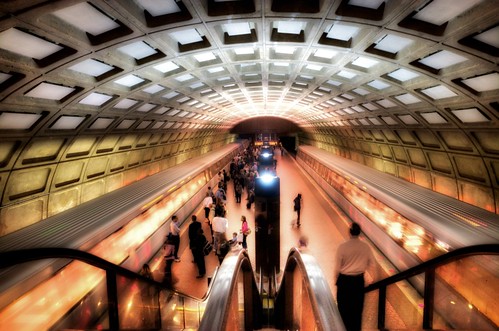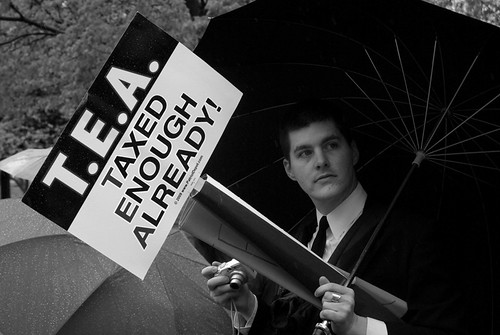
‘HDR Union Station Metro’
courtesy of ‘Cazimiro’
WMATA has a press release out announcing their intention to appeal the labor arbitration that has returned a 9% pay increase for Metro employees. I haven’t gotten my hands on the arbitration findings yet but I have looked at the law WMATA is referencing.
They assert in the press release that the arbitration report fails to meet certain standards required by law, primarily relating to examining the agency’s funding ability and whether it will “affect the public welfare.” I don’t think they’re being deliberately sneaky – that’s the way it’s phrased in the law – but it might not mean what it looks like on its face. C’mon in and let’s take a look at their three issues one by one, as well as their closing assertion that the resulting pay increase would top 9%.
First up, the assertion that the law: “Prohibits an arbitrator from rendering an award that provides for salaries and other benefits that exceed the interstate compact agency’s funding ability.”
That’s true, but it’s easy to take that as a statement that it has to do with how WMATA is currently funded. That’s not necessarily what the law says it means. Here’s the definition, right out of THOMAS, where “interstate compact agency” means WMATA:
`funding ability’ is the ability of the interstate compact agency, or of any governmental jurisdiction which provides subsidy payments or budgetary assistance to the interstate compact agency, to obtain the necessary financial resources to pay for wage and benefit increases for employees of the interstate compact agency;
The word “obtain” in there is significant, and exactly what it means probably would have to be – or has already been – hashed out in case law. In a very restrictive sense it might just mean what money anybody has on hand, which lately in WMATA and the local governments falls somewhere between jack and shit, and Jack left town. On the other extreme it might read as in whether it’s possible to raise fares and taxes, which however little we might like it is almost always possible.

‘doesn’t fit the normal stereotype’
courtesy of ‘philliefan99’
Next up, the assertion that the law “allows an increase in pay rates only if any costs to the agency do not adversely affect the public welfare”
Also true, but even more muddy. “Public welfare” gets a two part definition in the act. It’s defined as
- the financial ability of the individual jurisdictions participating in the compact to pay for the costs of providing public transit services; and
- the average per capita tax burden, during the term of the collective bargaining agreement to which the arbitration relates, of the residents of the Washington, D.C. metropolitan area, and the effect of an arbitration award rendered pursuant to such arbitration on the respective income or property tax rates of the jurisdictions which provide subsidy payments to the interstate compact agency established under the compact.
That’s back at the point above about getting money versus having it, and it acknowledges what I said above: in theory you can always keep raising taxes and fares, though at some point the villagers are going to pick up the pitchforks and come have a chat with you. Assuming they didn’t have to pawn their pitchforks to pay their tax bills.
Last up, WMATA says there’s a problem with the result because the act “Requires the arbitrator to issue a written award that demonstrates all of the factors in the Act.” That’s not exactly accurate, but close enough for their purposes. What it actually says is:
the arbitrator shall issue a written award that demonstrates that all the factors set forth in subsections (a) and (b) have been considered and applied
and
The arbitrator’s conclusion regarding the public welfare must be supported by substantial evidence.
From the look of that WMATA is over-stating their case with regard to the funding ability. The arbitration report needs to indicate that it was considered and applied, but “demonstrates all the factors” might be a bit strong. However since the second bit flows from the first – public welfare includes the various ways the money can be raised – it’s probably an irrelevant distinction.
Probably a much bigger issue is going to be the splatter when the shit hits the fan on this. The law WMATA is invoking here says that after a notice and hearing the “court shall review the award on the record, and shall vacate the award or any part of the award.” Getting to the end of an arbitration process and then just throwing the whole thing in the trash pile isn’t going to improve anybody’s mood.

‘N.Y. Greeks going home (LOC)’
courtesy of ‘The Library of Congress’
WMATA closes with the observation that the arbitration results “would result in wage increases exceeding 9 percent,” which may or may not be a big deal. The last union book published by ATU Local 689 covers a period of four years and specifies the raises over that period. Base pay for operators and everyone else may be different but they were modified according to the same scale over that time:
- 1.5% effective July 1, 2004
- 1.5% effective July 1, 2005
- 2.0% effective July 1, 2006
- 1.0% effective December 31, 2006
- 2.0% effective July 1, 2007
- 1.0% effective December 31, 2007
If you compound those they add up to a modifier of 1.093390196409…. just over 9% over a three and a half year period. So it may be that what WMATA is complaining about in the arbitration result is exactly identical to the progression over the previous period. Perhaps that’s not a reasonable schedule given the current economic conditions, but it should be discussed in context.
